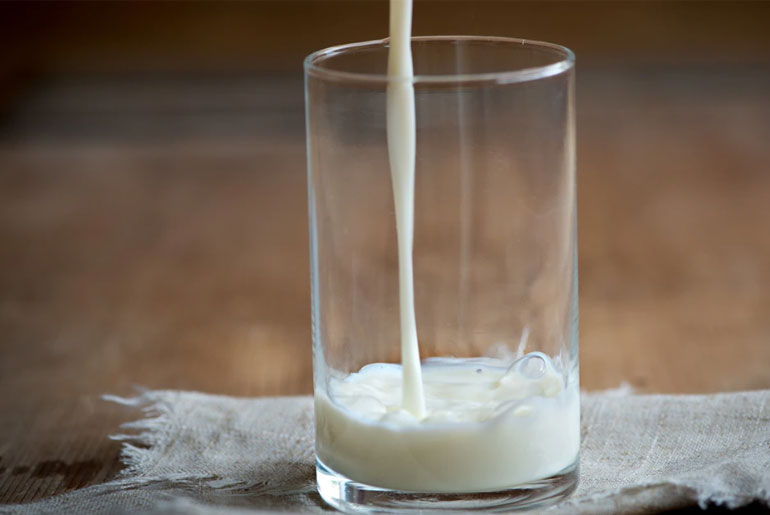Milk is widely recognized as a nearly complete food, providing balanced nutrition essential for the development of the mind and body, especially in children and adolescents. Rich in calcium, vitamin D, and essential proteins, milk supports the growth and strengthening of bones and teeth and contributes to overall physical health. However, the consumption of milk must be moderated to avoid potential health risks associated with excessive intake.
According to the Indian Council of Medical Research (ICMR), the upper value of calcium intake for adults is recommended at 600 mg per day, roughly equivalent to two glasses of milk. For adolescents aged 10-18 years, the recommended limit is higher at 800 mg per day. While milk is an important source of calcium, exceeding these recommended amounts can lead to health issues as one ages. The high fat content in milk, particularly saturated fats, can increase the risk of heart disease, high cholesterol, and other chronic conditions. The National Library of Medicine highlights that a single glass of milk contains about 5 grams of saturated fats, accounting for 20% of the daily recommended intake, which can contribute to the development of cardiovascular diseases by raising the LDL to HDL cholesterol ratio.
Furthermore, a Swedish study published in the British Medical Journal suggests that a high intake of milk is associated with an increased risk of bone fractures and mortality. This paradoxical finding indicates that while milk supports bone health, its excessive consumption may have adverse effects. Additionally, excessive milk intake can lead to iron deficiency anemia and protein loss from the gut, which are significant health concerns. Iron deficiency anemia can cause fatigue, weakness, and impaired cognitive function, while protein loss from the gut can affect overall nutritional status and immune function.
Milk is a dietary staple in many cultures, valued for its nutritional benefits. However, the high levels of lactose, saturated fats, and certain hormones present in milk can pose health risks when consumed in excess. Lactose intolerance can lead to digestive issues such as bloating, diarrhea, and abdominal pain. The saturated fats in milk contribute to cardiovascular risk, while hormones found in milk may have other health implications. Therefore, it is crucial to understand these potential consequences from a clinical standpoint and maintain a balanced approach to milk consumption.
Potential Health Risks of Excessive Milk Consumption:
1. Lactose Intolerance: Many individuals are lactose intolerant, meaning they lack sufficient lactase, the enzyme needed to digest lactose, the sugar in milk. This leads to symptoms such as bloating, gas, diarrhoea, and stomach cramps.
2. Weight Gain: Whole milk is calorie-dense, with about 180 calories per 250ml cup. Overconsumption can lead to excessive calorie intake and potential weight gain if not balanced with physical activity and a healthy diet.
3. Increased Cholesterol Levels: Whole milk contains saturated fats that can raise LDL (bad) cholesterol levels, increasing the risk of heart disease.
4. Nutrient Imbalances: Consuming too much milk can crowd out other essential food sources, leading to imbalances or deficiencies in essential nutrients such as vitamins, minerals, and fiber.
5. Iron Deficiency: Excessive milk consumption can interfere with iron absorption, especially in young children, potentially leading to iron deficiency anaemia.
6. Acne: Hormones naturally present in milk, like insulin-like growth factor 1 (IGF-1) and certain androgens, may exacerbate acne.
7. Digestive Problems: Even those without lactose intolerance can experience digestive discomfort from high milk intake due to the volume and fat content, leading to symptoms like bloating, diarrhoea, and abdominal pain.
8. Increased Risk of Fractures: Contrary to popular belief, high milk intake might increase the risk of fractures. Some studies suggest that excessive milk consumption can lead to higher excretion of calcium in urine, which may affect bone health negatively over time.
9. Cardiovascular Issues: Full-fat milk’s saturated fats can contribute to elevated cholesterol levels and increased cardiovascular disease risk. Low-fat and skim milk might still pose risks if consumed in large quantities due to added sugars.
10. Hormonal Imbalance: Commercial milk often contains hormones such as oestrogen and IGF-1, used to increase milk production. High consumption of milk can lead to elevated levels of these hormones in the body, potentially causing hormonal imbalances and increasing the risk of certain cancers, like prostate and breast cancer.
11. Kidney Stones: Excessive intake of calcium-rich foods, including milk, can raise the risk of kidney stones. High calcium intake can lead to the formation of calcium oxalate stones, especially in individuals with a history of kidney stones.
Conclusion: While milk is a valuable source of nutrients such as calcium and vitamin D, its excessive consumption can lead to various health issues. It’s important to consume milk in moderation and ensure a balanced diet that includes a variety of nutrient sources. Individuals with specific health concerns should consult healthcare providers for personalized dietary advice.
Disclaimer:
The information contained in this article is for educational and informational purposes only and is not intended as a health advice. We would ask you to consult a qualified professional or medical expert to gain additional knowledge before you choose to consume any product or perform any exercise.






